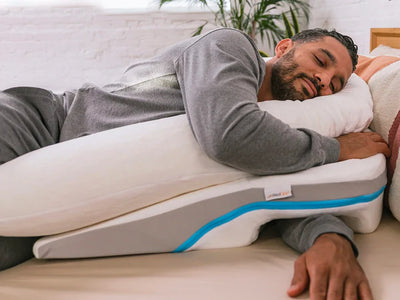
Related Product

Shoulder Relief System
$249.99 USD
Our system has a patented arm pocket that allows your arm to rest comfortably, alleviating pressure on your shoulder and triggering pain.
Rotator Cuff Pillow
Share
Your body's muscles and tendons work together to help you move through life. But sometimes, these systems can be disturbed by injuries and medical conditions. A rotator cuff injury is one of the most common muscle and tendon injuries, which drives nearly 2 million Americans to seek medical care each year.

The rotator cuff is a group of muscles and tendons surrounding your shoulder joint, keeping your arm and shoulder connected. This collection of muscles and tendons can be displaced or disturbed, causing dull aches and pains in the shoulder that can worsen over time. Additionally, rotator cuff injuries, such as a rotator cuff tear, may manifest as a more intense feeling of pain.
No matter the source of your shoulder pain, you’re likely looking for some relief. In this post, we’ll look at several methods of managing rotator cuff pain and focus on how you can find nighttime relief with the help of a rotator cuff pillow.
Read through for a comprehensive take on the causes of rotator cuff pain, helpful tips for managing shoulder pain, and learn how to choose the best pillow for rotator cuff pain. Or, use the links below to jump to the topic that best answers your question.
- Causes of Rotator Cuff-Related Shoulder Pain
- Treatment for Rotator Cuff Pain
- How to Choose the Best Pillow for Rotator Cuff Pain
- Rotator Cuff Pillow FAQs
- Picking a Rotator Cuff Shoulder Pain Pillow: Final Thoughts
Causes of Rotator Cuff-Related Shoulder Pain
There are several treatment methods for rotator cuff pain, but learning more about what’s causing your shoulder pain is an excellent place to start before you can find a remedy that works for you. According to the Mayo Clinic, generic shoulder pain can be caused by:
- Avascular necrosis (death of bone tissue due to limited blood flow)
- Brachial plexus injury
- Broken arm
- Broken collarbone
- Bursitis (joint inflammation)
- Cervical radiculopathy
- Dislocated shoulder
- Frozen shoulder
- Heart attack
- Impingement
- Osteoarthritis (disease causing the breakdown of joints)
- Polymyalgia rheumatica
- Rheumatoid arthritis (inflammatory joint disease)
- Rotator cuff injury
- Separated shoulder
- Septic arthritis
- Sprains
- Tendinitis
- Tendon rupture
- Thoracic outlet syndrome
- Torn cartilage
If your shoulder pain is more centralized near the top of your shoulder or worsens when you’re reaching up or out, you might be experiencing rotator cuff-related shoulder pain. Harvard Medical School cites the following as possible triggers of rotator cuff pain:
- Pushing off or applying pressure to your arms - Individuals with weakened knees, hips, or legs tend to apply more pressure to their arms when standing up from the ground or a chair. Your arms, specifically the muscles and tendons in your shoulders, are not built to withstand such pressure and can eventually wear down, causing rotator cuff pain.
- Repetitive reaching or winding -This motion can cause grinding and inflammation in the area. Activities such as swimming, pitching a baseball, painting, and doing pushups are commonly associated with rotator cuff injuries.
- Forceful or abrupt overhead movements - Tears are another trigger for rotator cuff pain and commonly occur among athletes. Abrupt force or movements such as starting up a lawn mower or wrestling can provoke rotator cuff injuries. Swinging sports like tennis, baseball, and racquetball can also cause these tears.
Now that you know a little bit more about the potential causes of rotator cuff pain and shoulder pain, let’s look at some ways you can manage your symptoms, specifically while you’re sleeping.

Treatment for Rotator Cuff Pain
According to Harvard Medical School, various treatment methods exist for tendonitis, bursitis, and minor rotator cuff injuries. These include the following:
- Physical therapy
- Corticosteroid injections
- Nonsteroidal anti-inflammatory drugs (NSAIDs)
- Ibuprofen
- Advil
- Motrin
- Ultrasound treatment
- Surgery
Other tips for managing rotator cuff pain
While chronic and more severe rotator cuff injuries may require surgery and other actions to resolve shoulder pain completely, you can do plenty of things to manage your symptoms on your own (and with the guidance of a healthcare professional).
Here are a few tips to help you take control of your rotator cuff pain:
- Following the first few days of your rotator cuff injury, apply ice to the affected area for 15-20 minutes every 4-6 hours.
- To minimize inflammation and pain, consider using a nonsteroidal anti-inflammatory drug (NSAID), such as ibuprofen.
- Avoid reaching up, out, or overhead so as not to trigger rotator cuff pain, but instead, do exercises that stretch and strengthen the area effectively. Some rotator cuff-friendly exercises include:
- Weighted pendulum exercise
- Towel stretch
- Cross-body stretch
- Inward rotation
- Outward rotation
- Use a rotator cuff pillow to support your body and minimize discomfort while sleeping (more on this below).
How to Choose the Best Pillow for Rotator Cuff Pain
Nighttime pain is extremely common in patients dealing with shoulder pain and rotator cuff injuries, with approximately 91% of patients reporting shoulder pain while sleeping. If you’re one of these people, the next best step to putting a stop to your pain may be as simple as using a rotator cuff pillow.
In this next section, we’ll discuss what a rotator cuff shoulder pain pillow is and offer some tips to help you choose the best one for your specific needs.
What is a Rotator Cuff Shoulder Pain Pillow?
A rotator cuff pillow, also known as a shoulder pillow, helps take pressure off the affected shoulder while sleeping on your side. But, not all sleep solutions are created equally. Unlike regular wedge pillows, our clinically proven Shoulder Relief System has a patented arm pocket that allows your arm to rest comfortably, alleviating pressure on your shoulder and triggering pain.
Benefits of Using a Rotator Cuff Pillow
Some of the benefits associated with using a rotator cuff pillow include reduced shoulder pressure, pain relief in the rotator cuff area and shoulder, and better sleep quality.
Choosing the Best Rotator Cuff Pillow for Surgery and Pain Management
Whether you’ve recently undergone shoulder surgery or are taking pain management into your own hands, take the time to do your research and find the right rotator cuff pillow for you.
Here are some things to consider when choosing the best pillow for rotator cuff pain.
- Your preferred sleeping position - Sleeping on your back or sleeping on your side (on the uninjured shoulder) are the best sleeping postures for shoulder pain. When choosing a rotator cuff pillow, look for one with a symmetrical design, like MedCline’s Shoulder Relief System, which allows for both left and right-side use with flexible arm positions.
- Materials - High-quality fabrics such as memory foam, buckwheat, latex, and down tend to offer more support for a longer period of time. Our positioning wedge, for example, is made of medical-grade materials composed of three-layer, cool gel-infused, and environmentally safe Certi-PUR® foam.
- Loft - Also known as thickness, loft describes how supportive the pillow feels. If you sleep on your side, you’ll need more support than back and stomach-sleepers. Ultimately, you want your head and neck to feel supported and in alignment with the rest of your body.
- Stability - The best pillows for surgery and rotator cuff pain keep your body stabilized so as not to trigger pain or discomfort in your shoulders or anywhere else where you might feel pain while sleeping. Our Shoulder Relief System not only stabilizes you all night so you don’t shift around in your sleep, but it also offers a gradual incline to elevate your body at a 10-degree angle, taking the pressure off your rotator cuff.
- Your physician’s instructions - As always, whenever you’re making medical decisions, consult your physician to find the most comprehensive treatment plan for your needs.

Rotator Cuff Pillow FAQs
To expand your research and knowledge of rotator cuff pillows, we’ve created a list of frequently asked questions and their answers below.
How does a rotator cuff shoulder pain pillow work?
Rotator cuff pillows support the head and neck while alleviating pressure from the affected shoulder, giving the arm a pocket to rest comfortably underneath.

What is the best-recommended pillow for recovering from a rotator cuff surgery?
A pillow that supports and stabilizes the body while alleviating pressure from the shoulder is generally considered to be the best rotator cuff pillow for surgery.
What is the best sleeping position for rotator cuff pain?
Sleeping on the side of your unaffected shoulder is considered the best sleeping position for dealing with shoulder and rotator cuff pain.
How do you relieve rotator cuff pain at night?
Using a medically proven rotator cuff pillow, such as MedCline’s Shoulder Relief System, is one of the most effective ways to relieve rotator cuff pain at night. Other helpful treatment tips include:
- Icing for 15-20 minutes every 4-6 hours directly after your injury
- Taking NSAIDs, such as ibuprofen, Advil, or Motrin, as needed
- Doing shoulder-strengthening and stretching exercises
Picking a Rotator Cuff Shoulder Pain Pillow: Final Thoughts
A large number of sleepers suffer from rotator cuff injuries and shoulder pain that keep them awake at night. Investing in a rotator cuff pillow is one easy way to find relief.
The best pillow for your rotator cuff pain will support your sleeping position, be made of high-quality materials, have the appropriate love, and provide stability and support. At MedCline, our sleep solutions tick all these boxes.
Want to learn more about how our Shoulder Relief System can help alleviate your rotator cuff pain? Head to our MedCline FAQ page or speak to one of our sleep specialists today.
Related Product

Shoulder Relief System
$249.99 USD
Our system has a patented arm pocket that allows your arm to rest comfortably, alleviating pressure on your shoulder and triggering pain.
